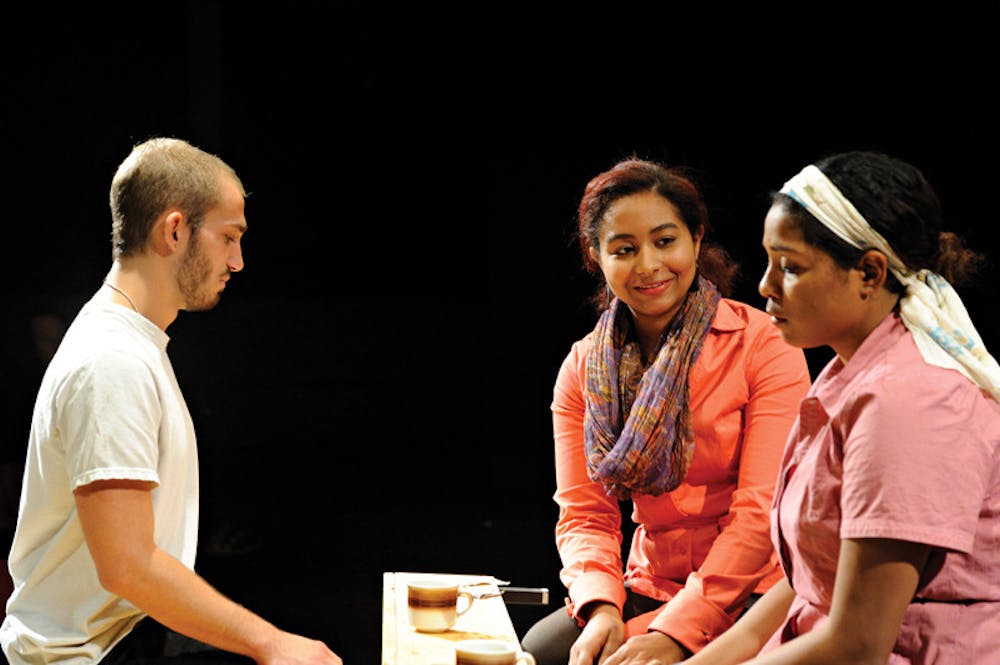Early in Quiara Alegria Hudes’ MFA’04 provocative play “Water by the Spoonful,” Yazmin Ortiz — an underpaid adjunct professor trying to infuse her Swarthmore College classroom with free jazz and “muzak” — instructs her students to go home and remember the first time they noticed musical dissonance. The idea is to appreciate the beauty of unlikely pairings. “This is your creation myth,” she tells them.
It’s difficult not to sense the start of a new world in Sock and Buskin’s staging of “Water,” a work brimming with so many ideas about 21st-century lives that it’s hard to know where to look. In the production, directed by Associate Professor of Theater Arts and Performance Studies Patricia Ybarra, characters address one another from literally all corners of Leeds Theater, present in their individual worlds as they simultaneously attempt to communicate with each other.
The play is largely concerned with these moments of contact and the ways people struggle to find family and friends in an interconnected but isolating modern age.
For most of its first half, “Water” comprises two separate narratives. In Philadelphia, Elliot Ortiz, played by Zach Rufa ’14, dreams of Hollywood stardom but must rely on a job at Subway to supplement the occasional appearance in a Colgate toothpaste ad, all as he struggles with the ghosts of his time as a Marine in Iraq. When family matriarch Mami Ginny dies, Elliot and his cousin Yazmin, played by Ivy Alphonse-Leja ’14, are forced to take charge of funeral arrangements as they contemplate the potential disintegration of their sprawling Puerto Rican family.
Elliot and Yazmin’s drama is interspersed with scenes that take place online — specifically, in a Narcotics Anonymous chat room. Hudes imaginatively renders the characters’ virtual comments as spoken dialogue, with characters saying aloud “L-O-L” and the moderator offering a tired “censored” whenever someone curses. Onstage, the conceit feels less gimmicky than it sounds: Typing in from around the globe, four crackheads share their stories of recovery and relapse, creating their own community with humor, haikus and tough love.
But do words on a screen constitute genuine connection? Hudes offers no easy answer. “Orangutan,” a 31-year-old American living in Japan, played by Natalie Cutler ’16, relays that her parents didn’t understand her addiction until they read her chat room posts — the Internet forges understanding where real life fails. Yet the people in the chat room never share their real names, hiding behind pseudonyms or initials to construct personas straddling a liminal space of identity.
In “Water’s” first scene, Elliot asks a professor to translate a line of Arabic that has haunted him since his honorable discharge six years ago. The man is reluctant at first, but he obliges: “Can I please have my passport back?” The phrase recurs throughout the show, a reminder of Elliot’s guilt and nightmares.
But if passports signal the ability to cross from one world into another, the play’s characters often have trouble distinguishing the borders between various spheres. Reality bleeds into the chat room’s anonymity, the two storylines intertwine, and everyone’s past — no matter how they try to run from it — threatens to steal into the present.
As the characters’ tangled web of relationships slowly reveals itself, another blurred dichotomy emerges — that of “families of choice versus families of blood,” as Ybarra put it, and the sacrifices that each type of relationship demands.
The play’s commentary on online forms of communication is “very pertinent in today’s world,” Cutler said. “You realize how much easier certain things are to say from behind a screen.”
Beneath all the personal stories, Hudes has a keen sense of her play’s various political subtexts. Addiction — and its racial and class-based facets — and the Iraq War cast two very different shadows over the action, while the chat room is fodder for subtle commentary about government and censorship. In the tradition of great art, “Water” portrays individual lives that both stand on their own and illuminate something deeper about society’s foibles and structures.
The show is a generous ensemble piece, and the acting is uniformly strong. Rufa’s bark is gruff, but his flickering eyes convey buried turmoil, and Alphonse-Leja performs a pragmatic, wistful role with equal skill. The chat room members make every emotion palpable, even as they stay mostly within their separate voms: Cutler, inflecting sarcasm with sorrow; Justin Harris ’15, a weary middle-aged Internal Revenue Service employee frightened of engaging offline; and Andrew Ganem ’16, alternately smarmy and smarting as an ex-CEO trying to conceal his addiction from his family.
As the online forum’s moderator, “Haiku Mom,” Shadura Lee ’16 emerges as the unexpected emotional lynchpin for both subplots in a nuanced portrayal of calm and fury.
In this dialogue-heavy play, Ybarra maintains the action at a rapid clip. The set design and costumes are appropriately simple so as not to divert attention from the ideas and actors swirling around the theater. Of particular note is the work by Lighting Designer Catherine Teitz ’14, especially in a climactic late scene that is pivotal for Elliot.
Harris noted the way staging mirrors the play’s thematic concerns, saying that the actors’ physical placement allows characters “to be present but be distant at the same time.”
Ybarra said she was attracted to the way Hudes plays with form in the script. “She has an incredibly musical structure to her play,” Ybarra said.
“Water” arrives at Brown with an impressive pedigree, having won the Pulitzer Prize for Drama in 2012. Thursday’s opening-night performance marked the play’s Rhode Island premiere, and Hudes was on hand for a talk-back with the audience after the show.
In this affecting assortment of bruised American lives, nobody escapes unscathed — including audience members, who are bound to have some of the eeriest moments imprinted on their minds long after the lights go up. But there is, by the end, a sense of forward momentum.
In its cadences and concerns, “Water by the Spoonful” is every bit a play for and of the times, where vulnerability is a computer password and the traditional family unit is an anachronism. But its spirit is universal, as characters seek relationships or experiences to break from the past and start something new. Not bad for a creation myth.
“Water by the Spoonful” will run Thursdays through Saturdays at 8 p.m. and Sunday at 2 p.m. from Sept. 26 to Oct. 6 at Leeds Theater.

ADVERTISEMENT




